Unit 3 The world of colours and light Grammar and usage(1)_ Inversion 课件(39张)
文档属性
| 名称 | Unit 3 The world of colours and light Grammar and usage(1)_ Inversion 课件(39张) | 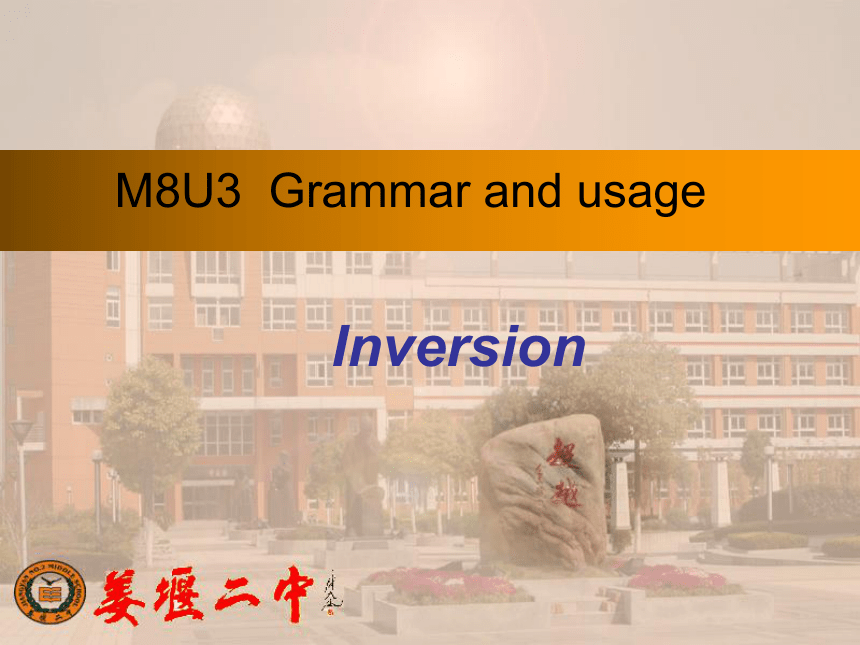 | |
| 格式 | zip | ||
| 文件大小 | 432.7KB | ||
| 资源类型 | 教案 | ||
| 版本资源 | 牛津译林版 | ||
| 科目 | 英语 | ||
| 更新时间 | 2019-08-03 17:17:07 | ||
图片预览

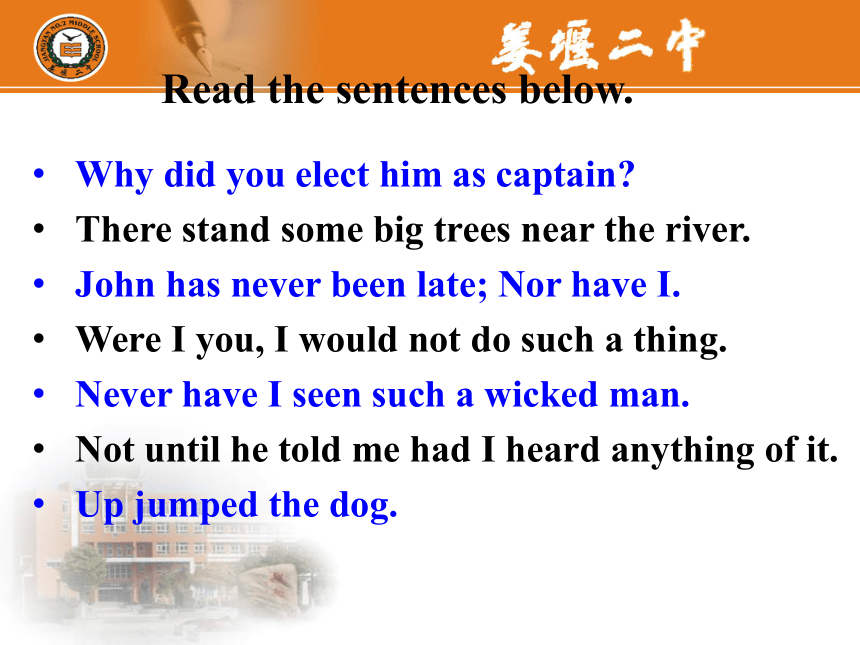
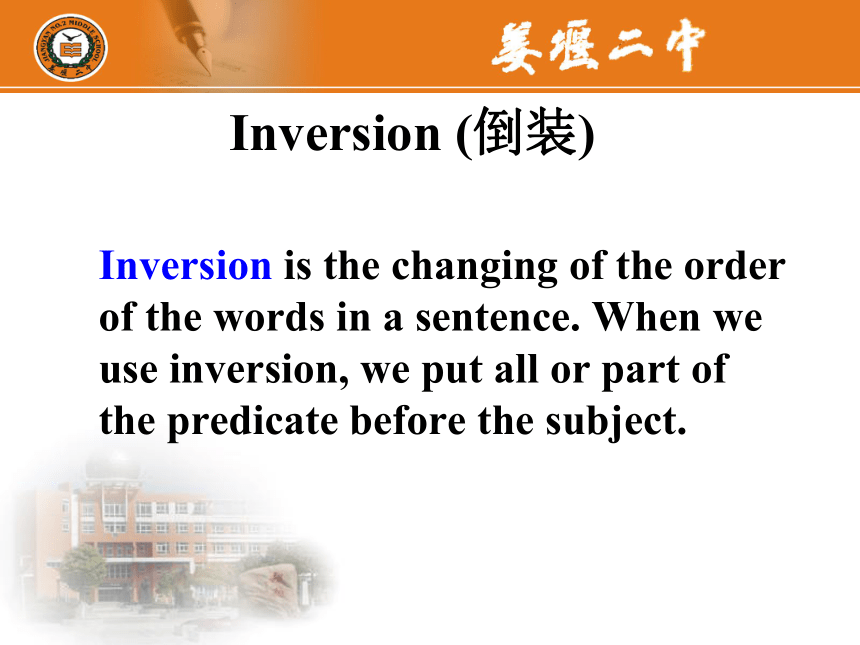
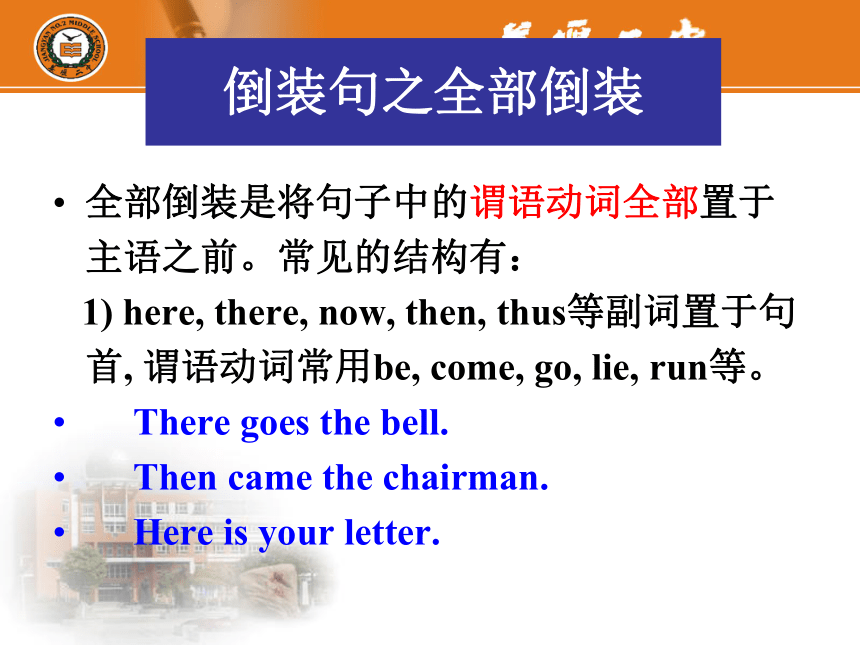
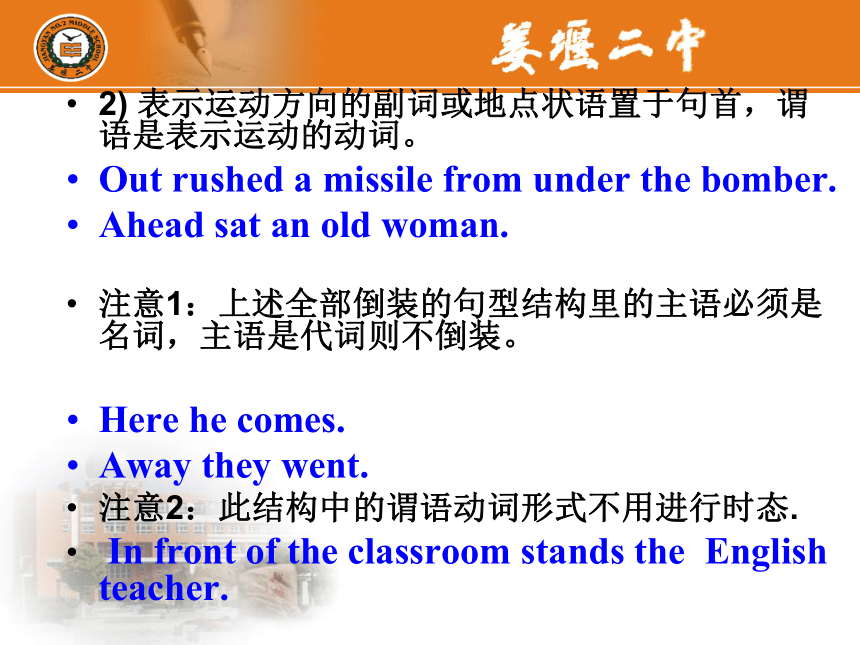
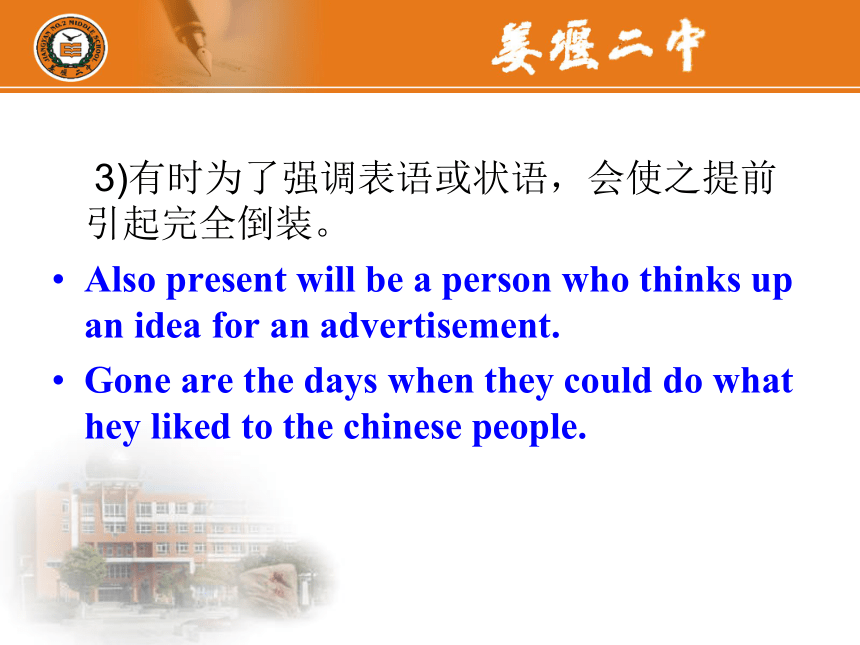
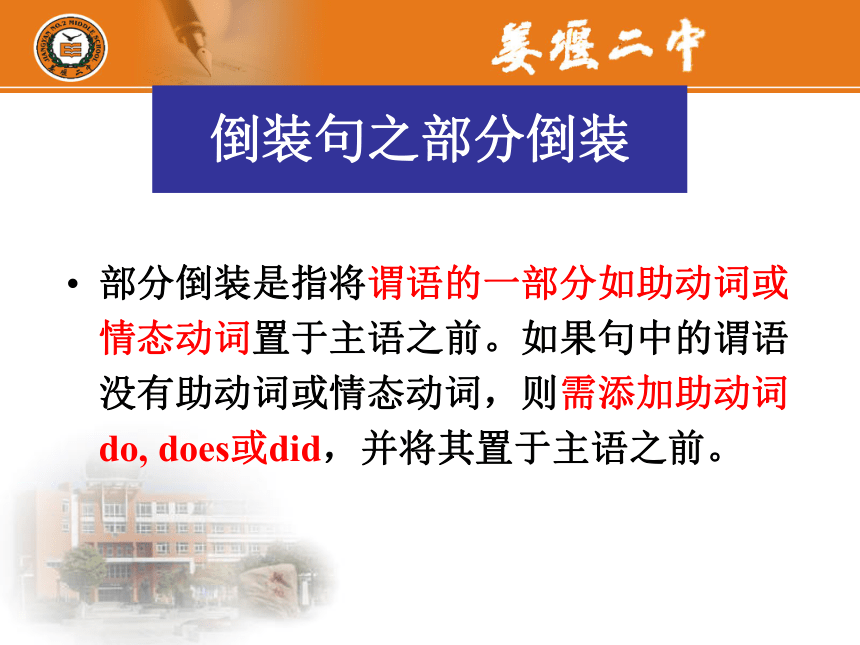
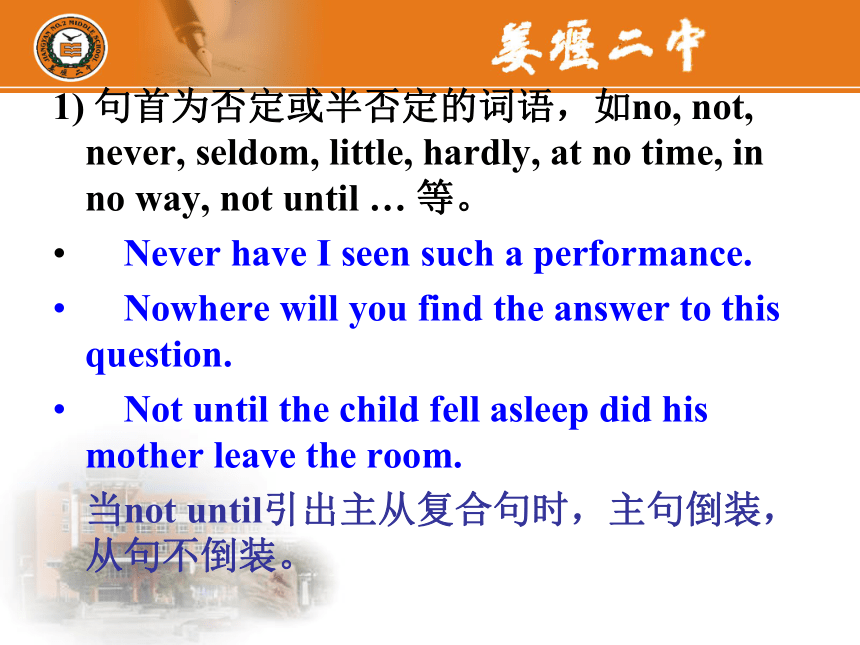
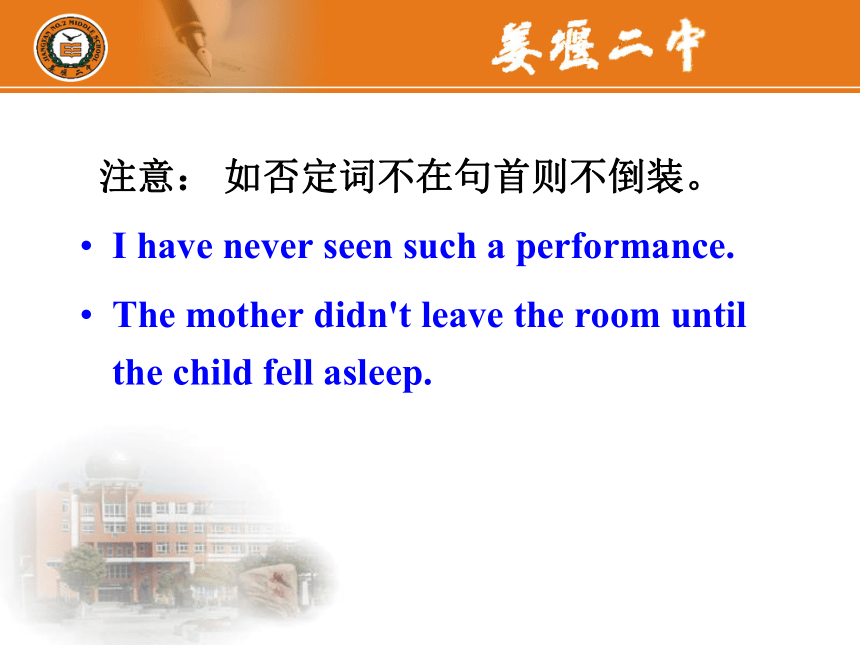
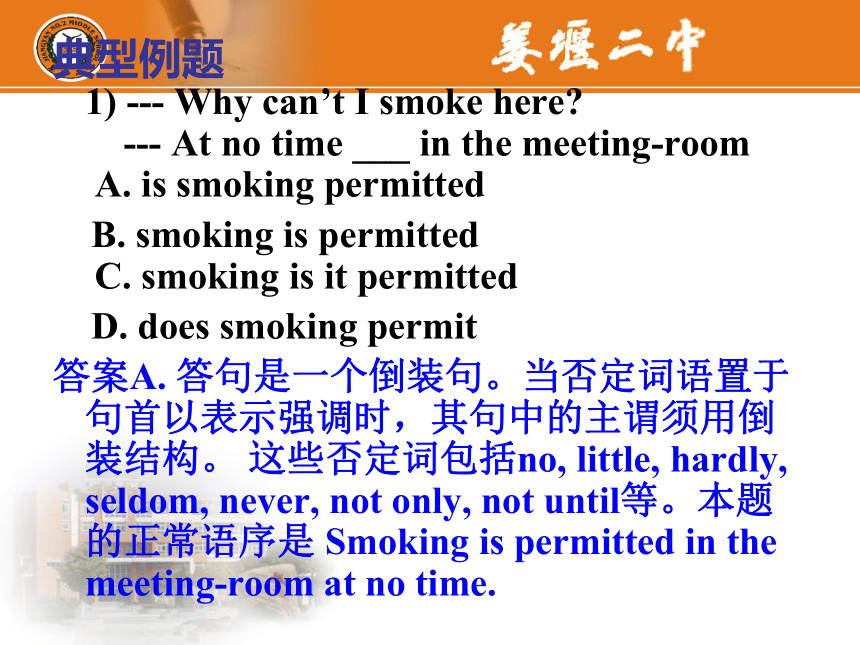
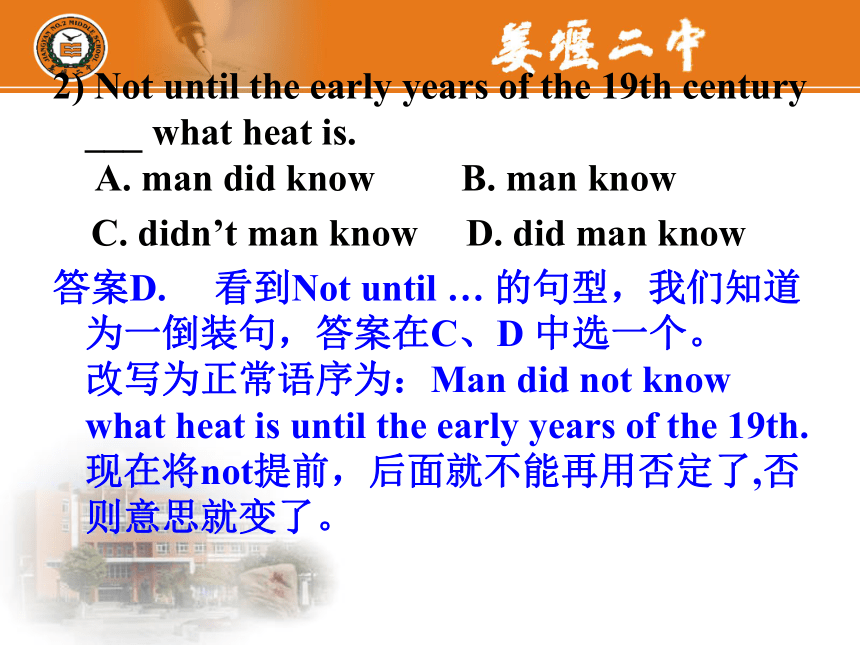
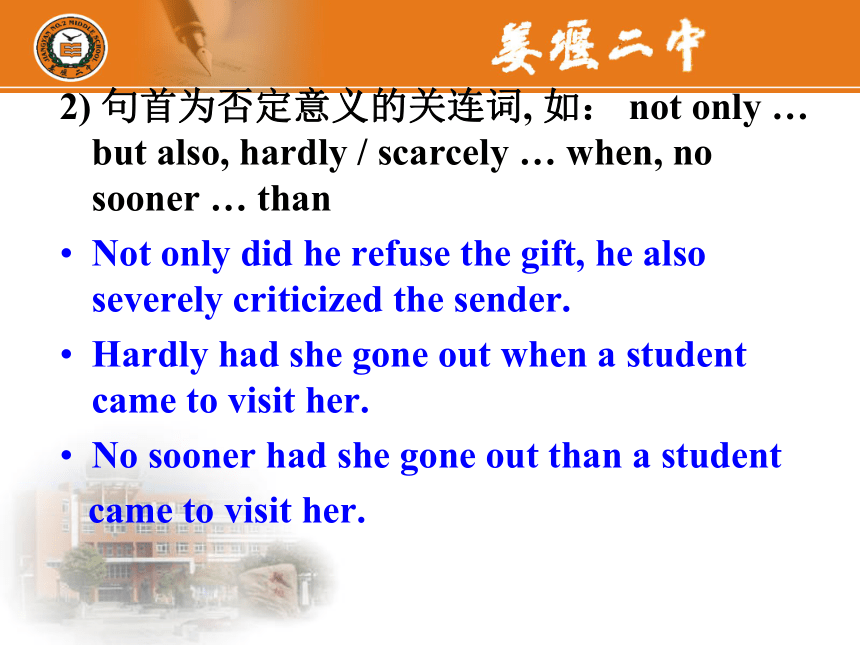
文档简介
课件39张PPT。 M8U3 Grammar and usageInversionRead the sentences below.Why did you elect him as captain?
There stand some big trees near the river.
John has never been late; Nor have I.
Were I you, I would not do such a thing.
Never have I seen such a wicked man.
Not until he told me had I heard anything of it.
Up jumped the dog. Inversion is the changing of the order of the words in a sentence. When we use inversion, we put all or part of the predicate before the subject. Inversion (倒装)倒装句之全部倒装 全部倒装是将句子中的谓语动词全部置于主语之前。常见的结构有:
1) here, there, now, then, thus等副词置于句首, 谓语动词常用be, come, go, lie, run等。
There goes the bell.
Then came the chairman.
Here is your letter.2) 表示运动方向的副词或地点状语置于句首,谓语是表示运动的动词。
Out rushed a missile from under the bomber.
Ahead sat an old woman.
注意1:上述全部倒装的句型结构里的主语必须是名词,主语是代词则不倒装。
Here he comes.
Away they went.
注意2:此结构中的谓语动词形式不用进行时态.
In front of the classroom stands the English teacher.
3)有时为了强调表语或状语,会使之提前引起完全倒装。
Also present will be a person who thinks up an idea for an advertisement.
Gone are the days when they could do what hey liked to the chinese people.倒装句之部分倒装 部分倒装是指将谓语的一部分如助动词或情态动词置于主语之前。如果句中的谓语没有助动词或情态动词,则需添加助动词do, does或did,并将其置于主语之前。1) 句首为否定或半否定的词语,如no, not, never, seldom, little, hardly, at no time, in no way, not until … 等。
Never have I seen such a performance.
Nowhere will you find the answer to this question.
Not until the child fell asleep did his mother leave the room.
当not until引出主从复合句时,主句倒装,从句不倒装。 注意: 如否定词不在句首则不倒装。
I have never seen such a performance.
The mother didn't leave the room until the child fell asleep.典型例题 1) --- Why can’t I smoke here? --- At no time ___ in the meeting-room A. is smoking permitted
B. smoking is permitted C. smoking is it permitted
D. does smoking permit
答案A. 答句是一个倒装句。当否定词语置于句首以表示强调时,其句中的主谓须用倒装结构。 这些否定词包括no, little, hardly, seldom, never, not only, not until等。本题的正常语序是 Smoking is permitted in the meeting-room at no time.2) Not until the early years of the 19th century ___ what heat is. A. man did know B. man know
C. didn’t man know D. did man know
答案D. 看到Not until … 的句型,我们知道为一倒装句,答案在C、D 中选一个。 改写为正常语序为:Man did not know what heat is until the early years of the 19th. 现在将not提前,后面就不能再用否定了,否则意思就变了。2) 句首为否定意义的关连词, 如: not only … but also, hardly / scarcely … when, no sooner … than
Not only did he refuse the gift, he also severely criticized the sender.
Hardly had she gone out when a student came to visit her.
No sooner had she gone out than a student
came to visit her.典型例题 No sooner ___ than it began to rain heavily.
A. the game began
B. has the game begun C. did the game begin
D. had the game begun
答案D. 具有否定意义的副词放在句首时,一般采用倒装句(谓语前置)。这类表示否定意义的词有never, seldom, scarcely, little, few, not, hardly, 以及not only … but (also), no sooner … than, hardly … when scarcely … when等等。 注意:只有当not only … but also连接两个分句时,才在第一个分句用倒装结构。如果置于句首的not only … but also仅连接两个并列词语,不用倒装结构。
Not only am I fond of music but also he likes it deeply.
Not only you but also I am fond of music.
3) so, neither, nor在表示“也”、“也不” 的结构中,句子要部分倒装。
Tom can speak French. So can Jack.
If you won't go, neither will I. 典型例题 --- Do you know Jim quarreled with his brother? --- I don’t know, _____.
A. nor don’t I care B. nor do I care C. I don't care neither D. I don't care also
答案:B。nor为增补意思"也不关心",因此句子应倒装。A错在用 don't 再次否定, C neither 用法不对且缺乏连词。 D缺乏连词。注意: 当so引出的句子用以对上文内容加以证实或肯定时,意为“的确如此”,不用倒装结构。
Tom asked me to go to play football and so I did.
--- It’s raining hard.
--- So it is.Invert the sentences with negative words.1. I have never seen such beautiful flowers in the city.2. I do not have time to go to the museum today and I also do not want to.Never have I seen such beautiful flowers in the city. Neither do I have time to go to the museum today nor do I want to.3. I could hardly believe my eyes when I saw the sculpture in the museum.4.The poet is always writing; he is seldom seen without a notebook in his hand.Hardly could I believe my eyes when I saw the sculpture in the museum.The poet is always writing; seldom is he seen without a notebook in his hand.4) only在句首要倒装的情况 Only in this way, can you learn English well.
Only after being asked three times did he come to the meeting.
如果句子为主从复合句,则主句倒装,从句不倒装。
Only when he is seriously ill, does he ever stay in bed.
Only 后面接的是名词或代词时,则不用倒装。
Only I really care you.5)as / though引导的让步从句,将表语、状语或谓语的一部分前置(形容词, 副词, 分词, 实义动词提前),表示强烈的对照。 注意:
句首名词不能带任何冠词。
2) 句首是实义动词, 其他助动词放在主语后。如果实义动词有宾语和状语, 随实义动词一起放在主语之前。Child as he is , he is considerate and willing to help others.
Try hard as he will, he never seems able to do the work satisfactorily.
注意:
让步状语从句中,有though,although时,后面的主句不能有but,但是 though 和yet可连用。其他部分倒装 so… that 句型中的so 位于句首时,需倒装。
So frightened was he that he did not dare to move an inch.
2) 在某些表示祝愿的句型中。
May you all be happy.
3) 在虚拟语气条件句中,从句谓语动词有were, had, should等词,可将if 省略,把 were, had, should 移到主语之前,采取部分倒装。
Were I you, I would try it again. Practice
______ that he could not speak for a long time. A. So frightened was he????
B. So frightened he was C. Was he so frightened??????
D. Frightened was he
2. Only when class began ______ that he had left his book at home. A. will he realize??? B. he did realize C. did he realize????? D. should he realizeAC 3. ______ that I couldn’t be absorbed in the work. A. They made such talked?? B. So loudly they talked C. It was noise outside???? D. Such a loud noise did they make
4. ______ I would see you here.
A. Little I dreamed B. Little do I dream
C. I dreamed little D. Little did I dream
5. _____the plane.
A. Flew down B. Down flew
C. Down was flying D. Down flyDDB巩固练习11. Not until he left his home ______ to know how important the family was for him.
A. did he begin
B. had he begun
C. he began
D. he had begunA 2. We laugh at jokes,but seldom ______ about how they work.
A.we think
B.think we
C.we do think
D.do we thinkD 3. — Is everyone here?
— Not yet … Look, there _____ the rest of our guests!
A. come
B. comes
C. is coming
D. are comingA4. At the meeting place of the Yangtze River and the Jialing River ______, one of the ten largest cities in China.
A. lies Chongqing
B. Chongqing lies
C. does lie Chongqing
D. does Chongqing lie A5.The headmaster will not permit the change in the course, nor _____ it a thought.
A. does he even give
B. he even gives
C. will he even give
D. he will even giveC6.Only after Mary read her composition the second time _____ the spelling mistake.
A. did she notice
B. she noticed
C. does she notice
D. she has noticedA7.Never before _____ seen anybody who can play tennis as well as Robert.
A. had she B. she had
C. has she D. she hasC8.This is not my story, nor _____ the whole story. My story plays out differently.
A. is there B. there is
C. is it D. it isC9.Not until he retired from teaching three years ago _____ having a holiday abroad.
A. he had considered
B. had he considered
C. he considered
D. did he considerD10.Only with the greatest of luck ___ to escape from the rising flood waters.
managed she
B. she managed
C. did she manage
D. she did manageC 11.Not once ________ to Michael that he could one day become a top student in his class.
A. occurred it B. it did occur
C. it occurred D. did it occur
12.“Never for a second ,” the boy says, “ _______ that my father would come to my rescue.”
A. I doubted B. do I doubt
C. I have doubted D. did I doubtDD13.Only when he apologizes for his rudeness _______ to him again.
A. I will speak B. will I speak C. do I speak D. I speak
14.At no time ________ the rules of the game. It was unfair to punish them.
A. they actually broke B. do they actually break
C. did they actually break D. they had actually brokenBC巩固练习2Write the following e-mail using inversion.
这里的天气是如此多变,我们担心不能开心地玩。但后来婶婶真地很享受,我和奶奶也是!由于从来没有走这么多路,我把脚给扭了。伤得如此严重,只能被送到医院。如果没被送到这里,我不会知道这里的氛围是如此的温暖。病房里有来自各地的游客,都微笑着问候对方。刚刚离开医院才意识到地图落那里了。匆忙赶回,发现它还躺在那儿!还算幸运!我从来没看到这么多美景呢!当我看到那里这么多美丽的花儿时,我几乎不能相信自己的眼睛了。如果你和我们一起来的话,你也一定会很享受的。
Accumulation really counts.
Success lies in persistence.
Practice makes perfect.
There stand some big trees near the river.
John has never been late; Nor have I.
Were I you, I would not do such a thing.
Never have I seen such a wicked man.
Not until he told me had I heard anything of it.
Up jumped the dog. Inversion is the changing of the order of the words in a sentence. When we use inversion, we put all or part of the predicate before the subject. Inversion (倒装)倒装句之全部倒装 全部倒装是将句子中的谓语动词全部置于主语之前。常见的结构有:
1) here, there, now, then, thus等副词置于句首, 谓语动词常用be, come, go, lie, run等。
There goes the bell.
Then came the chairman.
Here is your letter.2) 表示运动方向的副词或地点状语置于句首,谓语是表示运动的动词。
Out rushed a missile from under the bomber.
Ahead sat an old woman.
注意1:上述全部倒装的句型结构里的主语必须是名词,主语是代词则不倒装。
Here he comes.
Away they went.
注意2:此结构中的谓语动词形式不用进行时态.
In front of the classroom stands the English teacher.
3)有时为了强调表语或状语,会使之提前引起完全倒装。
Also present will be a person who thinks up an idea for an advertisement.
Gone are the days when they could do what hey liked to the chinese people.倒装句之部分倒装 部分倒装是指将谓语的一部分如助动词或情态动词置于主语之前。如果句中的谓语没有助动词或情态动词,则需添加助动词do, does或did,并将其置于主语之前。1) 句首为否定或半否定的词语,如no, not, never, seldom, little, hardly, at no time, in no way, not until … 等。
Never have I seen such a performance.
Nowhere will you find the answer to this question.
Not until the child fell asleep did his mother leave the room.
当not until引出主从复合句时,主句倒装,从句不倒装。 注意: 如否定词不在句首则不倒装。
I have never seen such a performance.
The mother didn't leave the room until the child fell asleep.典型例题 1) --- Why can’t I smoke here? --- At no time ___ in the meeting-room A. is smoking permitted
B. smoking is permitted C. smoking is it permitted
D. does smoking permit
答案A. 答句是一个倒装句。当否定词语置于句首以表示强调时,其句中的主谓须用倒装结构。 这些否定词包括no, little, hardly, seldom, never, not only, not until等。本题的正常语序是 Smoking is permitted in the meeting-room at no time.2) Not until the early years of the 19th century ___ what heat is. A. man did know B. man know
C. didn’t man know D. did man know
答案D. 看到Not until … 的句型,我们知道为一倒装句,答案在C、D 中选一个。 改写为正常语序为:Man did not know what heat is until the early years of the 19th. 现在将not提前,后面就不能再用否定了,否则意思就变了。2) 句首为否定意义的关连词, 如: not only … but also, hardly / scarcely … when, no sooner … than
Not only did he refuse the gift, he also severely criticized the sender.
Hardly had she gone out when a student came to visit her.
No sooner had she gone out than a student
came to visit her.典型例题 No sooner ___ than it began to rain heavily.
A. the game began
B. has the game begun C. did the game begin
D. had the game begun
答案D. 具有否定意义的副词放在句首时,一般采用倒装句(谓语前置)。这类表示否定意义的词有never, seldom, scarcely, little, few, not, hardly, 以及not only … but (also), no sooner … than, hardly … when scarcely … when等等。 注意:只有当not only … but also连接两个分句时,才在第一个分句用倒装结构。如果置于句首的not only … but also仅连接两个并列词语,不用倒装结构。
Not only am I fond of music but also he likes it deeply.
Not only you but also I am fond of music.
3) so, neither, nor在表示“也”、“也不” 的结构中,句子要部分倒装。
Tom can speak French. So can Jack.
If you won't go, neither will I. 典型例题 --- Do you know Jim quarreled with his brother? --- I don’t know, _____.
A. nor don’t I care B. nor do I care C. I don't care neither D. I don't care also
答案:B。nor为增补意思"也不关心",因此句子应倒装。A错在用 don't 再次否定, C neither 用法不对且缺乏连词。 D缺乏连词。注意: 当so引出的句子用以对上文内容加以证实或肯定时,意为“的确如此”,不用倒装结构。
Tom asked me to go to play football and so I did.
--- It’s raining hard.
--- So it is.Invert the sentences with negative words.1. I have never seen such beautiful flowers in the city.2. I do not have time to go to the museum today and I also do not want to.Never have I seen such beautiful flowers in the city. Neither do I have time to go to the museum today nor do I want to.3. I could hardly believe my eyes when I saw the sculpture in the museum.4.The poet is always writing; he is seldom seen without a notebook in his hand.Hardly could I believe my eyes when I saw the sculpture in the museum.The poet is always writing; seldom is he seen without a notebook in his hand.4) only在句首要倒装的情况 Only in this way, can you learn English well.
Only after being asked three times did he come to the meeting.
如果句子为主从复合句,则主句倒装,从句不倒装。
Only when he is seriously ill, does he ever stay in bed.
Only 后面接的是名词或代词时,则不用倒装。
Only I really care you.5)as / though引导的让步从句,将表语、状语或谓语的一部分前置(形容词, 副词, 分词, 实义动词提前),表示强烈的对照。 注意:
句首名词不能带任何冠词。
2) 句首是实义动词, 其他助动词放在主语后。如果实义动词有宾语和状语, 随实义动词一起放在主语之前。Child as he is , he is considerate and willing to help others.
Try hard as he will, he never seems able to do the work satisfactorily.
注意:
让步状语从句中,有though,although时,后面的主句不能有but,但是 though 和yet可连用。其他部分倒装 so… that 句型中的so 位于句首时,需倒装。
So frightened was he that he did not dare to move an inch.
2) 在某些表示祝愿的句型中。
May you all be happy.
3) 在虚拟语气条件句中,从句谓语动词有were, had, should等词,可将if 省略,把 were, had, should 移到主语之前,采取部分倒装。
Were I you, I would try it again. Practice
______ that he could not speak for a long time. A. So frightened was he????
B. So frightened he was C. Was he so frightened??????
D. Frightened was he
2. Only when class began ______ that he had left his book at home. A. will he realize??? B. he did realize C. did he realize????? D. should he realizeAC 3. ______ that I couldn’t be absorbed in the work. A. They made such talked?? B. So loudly they talked C. It was noise outside???? D. Such a loud noise did they make
4. ______ I would see you here.
A. Little I dreamed B. Little do I dream
C. I dreamed little D. Little did I dream
5. _____the plane.
A. Flew down B. Down flew
C. Down was flying D. Down flyDDB巩固练习11. Not until he left his home ______ to know how important the family was for him.
A. did he begin
B. had he begun
C. he began
D. he had begunA 2. We laugh at jokes,but seldom ______ about how they work.
A.we think
B.think we
C.we do think
D.do we thinkD 3. — Is everyone here?
— Not yet … Look, there _____ the rest of our guests!
A. come
B. comes
C. is coming
D. are comingA4. At the meeting place of the Yangtze River and the Jialing River ______, one of the ten largest cities in China.
A. lies Chongqing
B. Chongqing lies
C. does lie Chongqing
D. does Chongqing lie A5.The headmaster will not permit the change in the course, nor _____ it a thought.
A. does he even give
B. he even gives
C. will he even give
D. he will even giveC6.Only after Mary read her composition the second time _____ the spelling mistake.
A. did she notice
B. she noticed
C. does she notice
D. she has noticedA7.Never before _____ seen anybody who can play tennis as well as Robert.
A. had she B. she had
C. has she D. she hasC8.This is not my story, nor _____ the whole story. My story plays out differently.
A. is there B. there is
C. is it D. it isC9.Not until he retired from teaching three years ago _____ having a holiday abroad.
A. he had considered
B. had he considered
C. he considered
D. did he considerD10.Only with the greatest of luck ___ to escape from the rising flood waters.
managed she
B. she managed
C. did she manage
D. she did manageC 11.Not once ________ to Michael that he could one day become a top student in his class.
A. occurred it B. it did occur
C. it occurred D. did it occur
12.“Never for a second ,” the boy says, “ _______ that my father would come to my rescue.”
A. I doubted B. do I doubt
C. I have doubted D. did I doubtDD13.Only when he apologizes for his rudeness _______ to him again.
A. I will speak B. will I speak C. do I speak D. I speak
14.At no time ________ the rules of the game. It was unfair to punish them.
A. they actually broke B. do they actually break
C. did they actually break D. they had actually brokenBC巩固练习2Write the following e-mail using inversion.
这里的天气是如此多变,我们担心不能开心地玩。但后来婶婶真地很享受,我和奶奶也是!由于从来没有走这么多路,我把脚给扭了。伤得如此严重,只能被送到医院。如果没被送到这里,我不会知道这里的氛围是如此的温暖。病房里有来自各地的游客,都微笑着问候对方。刚刚离开医院才意识到地图落那里了。匆忙赶回,发现它还躺在那儿!还算幸运!我从来没看到这么多美景呢!当我看到那里这么多美丽的花儿时,我几乎不能相信自己的眼睛了。如果你和我们一起来的话,你也一定会很享受的。
Accumulation really counts.
Success lies in persistence.
Practice makes perfect.
